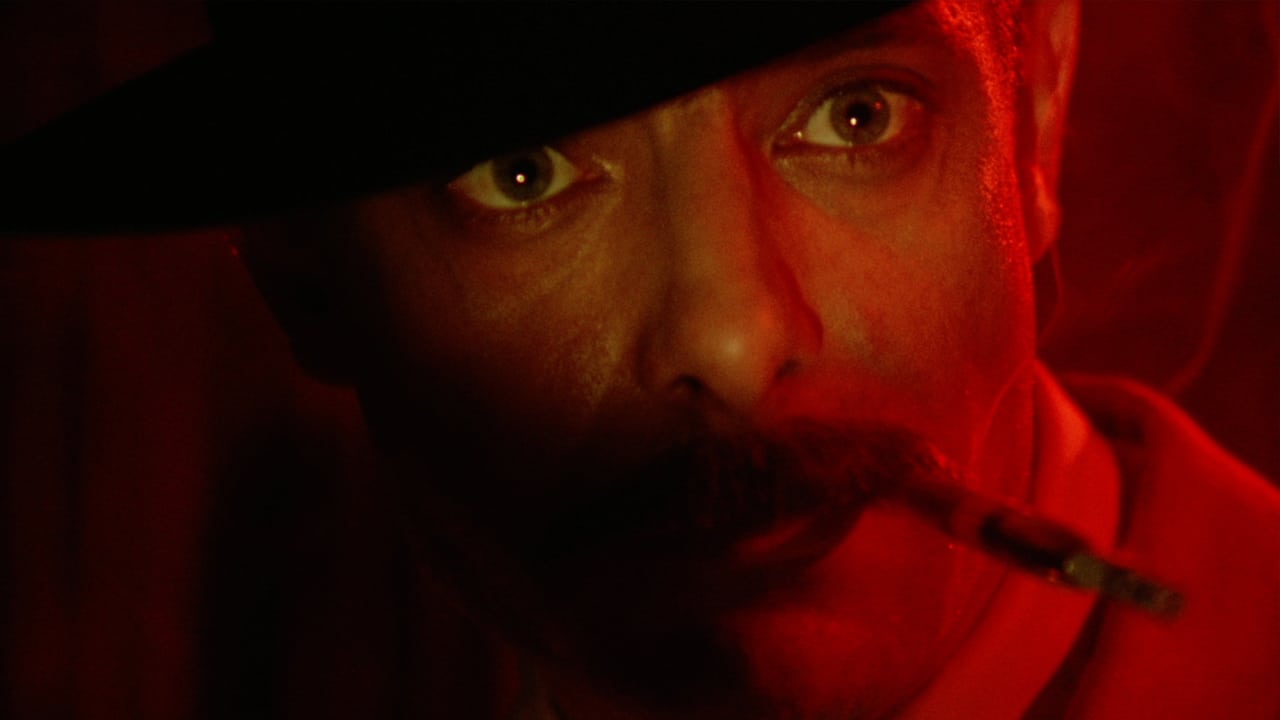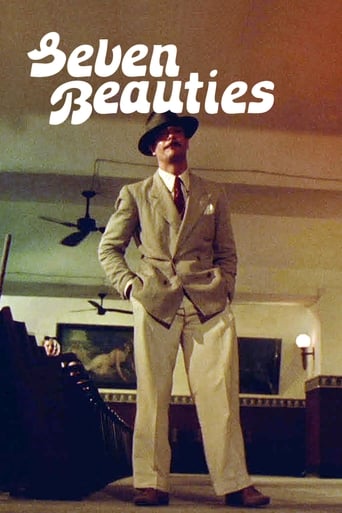

What a waste of my time!!!
... View Morethe audience applauded
... View MoreIt isn't all that great, actually. Really cheesy and very predicable of how certain scenes are gonna turn play out. However, I guess that's the charm of it all, because I would consider this one of my guilty pleasures.
... View MoreBlistering performances.
... View MoreThis movie is a 9, running into a 10, when it comes to rating top films ever, across all genres. Director Wertmüller runs you through some indeed obscure dips of human cross, while you are actually laughing your eyes off. And it all happens at the tracked speed and vigor of a lopsided roller coasting thriller steeped with all manners of humor. It may be a mistake to attempt any proper review of the film by setting it into a particular geographic or historic time frame. As regards its sexual overtures, Ebert himself cons "- in what's easily the least erotic sex scene ever filmed". Ebert was not downplaying the director's mastery. The character in point was attempting to seduce a female prison commandant on the recollection of his mother's advise that even the most inaccessible of women can be reached through a hit to the heart. Of course he worked at it, and even worked all over her, but of course it did not work. Very, very good film. Was nominate for 4 Oscars. Should have won 5.
... View MoreI watched this film just recently all the way through, having watched just a part of it years before. I kept thinking of "Life is beautiful" and how upset I was with that film. By upset I mean disgusted with the premise. I could not imagine what that film wanted me to. Seven Beauties goes back to the exact same landscape and arrives at a completely different portrayal.I must confess that I consider Giancarlo Giannini to be one of the greatest actors ever to appear on film in any language. His style is different than say Al Pacino, Robert DeNiro or Jack Nicholson. With Giannini what always blows me away is what he can do with his eyes and simple facial gestures. Take for example the scene where in this film he is in court awaiting the sentence for murder. His eyes catches those of a young woman he had met in the street and with whom he does a light hearted bit of flirting. Their eyes meet and entire paragraphs of dialog go back and forth between them and not a word is spoken. I was just dumbfounded. Who acts this way anymore? Just about no one. His style often reminds me of the silent greats like Chaplin (in particular) who had to emote through their faces because the audience could not hear them speak.What is this film about? Is it just an anti-Nazi rant? Not really. Wertmuller at her best, had a full palette of dramatic colors splashing about and this is perhaps her best movie. Pasqualino Frafuso as a character is both hilarious, a complete puff-ball of inflated over confidence, a sole defender of his down and out family's honor and much more. As a bumbling tough-guy-wannabe, he manages to get himself into an insane asylum; perhaps the central motif of the entire movie. He moves from one insane chapter into another. (Major spoiler)...as a survivor, we are not sure what state of mind or soul he is in when he comes back to his family.There is a key element of the dialog mirroring the directors social ethos. When Pasqualino and another Italian soldier witness German soldiers killing (what they presume) are Jews and dumping their bodies into mass graves) and in fleeing the scene the other soldier is gripped with a terrible sense of guilt...we must take note of a key message. Should we turn away when gross injustice is done to our common man or should we protect ourselves with the certainty of silence? The concentration camp scenes are very harrowing but what is incredible in this film is that despite the utterly bleak reality, we can laugh a just a little bit. It is a macabre humor, very black and teetering on a dream like quality. I am reminded of some scenes in Fellini's "Satyricon".The German commandant is a woman (most unlikely in real life) and is depicted in an over the top portrayal of life hating, totally unattractive female, who is all too aware that her war is going to wind down and she is on the loosing side. She absolutely hates the Italians she has to incarcerate and she barbarically enjoys killing them at random. That Pasqualino decides that he can seduce her is both comical and very sad at the same time. That he succeeds is beyond his or our own vivid imagination. The one thing he knew for sure was that as a very unattractive woman she most certainly was starved for sexual gratification, even if it must come from someone she hated and loathed. That is the deal with the devil he plays in order to eat and survive. Did he sell his soul to the dark side at this point? We do not get a clear answer and that is another strength in the drama. Wertmuller is telling us that there is always much more gray than colored outlines when we look to define moral limitations, and the choices made under enormous duress. What would we do to survive such hell? Are we so sure we would not lower ourselves to ANY level in order to survive? Many did and that is her point. We are not encouraged to take sides and judge. We are reminded that life sometimes takes over and we are washed away in currents much stronger than our simple moral and ethical compass we felt so sure of as a younger person.Ultimately this film satisfies as a monumental drama on so many levels. Pasqualino's sisters and mother (as actors) are outstanding, especially the eldest sister, who is made to look more ugly than ugly. The struggle to find a place in life with the burden of such horrid looks is held up in a severe way; however, we are also aware that it is over done and very exaggerated. Like some fulsome opera drama, her struggle to find safety, financial freedom and social esteem mirror the struggles of millions of others in the lower, working classes. A very familiar theme in Italian cinema. That her brother, another who felt himself to be an ugly duckling, manages to reach his own level of self-sufficiency, at the cost of hell on earth, ties a very nice parallel to her own travails. A family touched by tragedy on many levels, they miraculously survive the war intact.Seven Beauties is worth many viewings. A richly textured, very well written drama of very intense contrasts, a perfect vehicle for outstanding acting at both comedic and dramatic heights. One of the best films I've ever seen. My personal favorite of Giannini's, equal to or even surpassing his performance in Swept Away. Perhaps Wertmullers most coherent social commentary/drama masterpiece.
... View MoreLena Wertmuller has created a fascinating cocktail, one part anti-war film, one part medieval morality play, one part black comedy, shaken vigorously and poured over plenty of fine acting.If growing up in Fascist Italy doesn't give a young boy a slightly distorted sense of manhood, having your bricklayer father die leaving you the sole male in a family of a mother and seven sisters, made sure of the fact; so we find Pascolino, a handsome but strutting ladies' man who carries a pistol in his belt to "command respect." And so begins a roller coaster of events both comic and tragic that deliver him like so many other young men, into the maw of WW2, completely unprepared to cope with the stupidity and inefficiency of large governments at war, the contempt for both the sacred and the profane, the massacre of civilians unlucky enough to be in the way, the destructions of villages, towns, even entire cities, in short these young men are overwhelmed by the evil that is created from both sides of every war as surely and repetitively as an ocean beach is overwhelmed by the incoming tides.Seven Beauties makes its anti-war thrust accessible like another more famous film, Catch-22, by blurring it's humor into the absurd. When Wertmuller shows us the vapidness of Pascolino's life as he struts around the family business or ghoulishly dismembering a body he killed, I think she is taking a more profound view of human existence than just an anti-war film, by showing us the inconsistencies, follies, and sin that inhabit everyday life, might even be the building blocks of national wars. Pascolino's supposed credo is respect, yet where is the respect in defending your sister's honor, if she is in love with her pimp; of challenging the pimp mano a mano, only to kill him by accident ; of volunteering to fight for his country, as a way to escape from a psychiatric ward; of shooting your friend, to save your own life; of finally returning home from defending your country, to find your seven sisters have become prostitutes? The inevitable question becomes, what is there to respect? Even the representative of authority and control, the prison camp commandant, is swept away by the follies of her own system and the temptations of power, while Pascolino is an Everyman, demonstrating the inevitable folly humankind falls into trying to live apart from God.
... View MoreThe old adage: "He who fights and runs away Lives to fight another day" seems to pretty well summarise Pascalino's attitude to life. He is very much on the run through much of this film. After all he did murder a man who deflowered his sister. But then he believes murder is permissible under some circumstances e.g. when the honour of the family is at stake. As for war, why kill people you do not even know? This and many other questions he keeps asking himself.I happened upon this gem of a film quite unexpectedly. The title meant nothing to me. For the first part of the film I was disarmed by a light comedy, so very Italian, about a "casanova" who had all the ladies swooning. I was enjoying his antics (perhaps learning a thing or two) when suddenly, captured and thrust into the confines of a Nazi prison camp he became a tragic figure indeed as he tried to seduce (using every known technique)the very brutal Commandant, a fearsome woman to be sure.The horrors of war and the terrible decisions which have to be made to save one's own skin becomes the major thrust of this film.It's a thoroughly entertaining anti-war film with some home-spun philosophy about war and life in general which deserves deep thought by those contemplating any type of warfare. The message is just as pertinent today as it was when this film was made nearly 30 years ago.
... View More